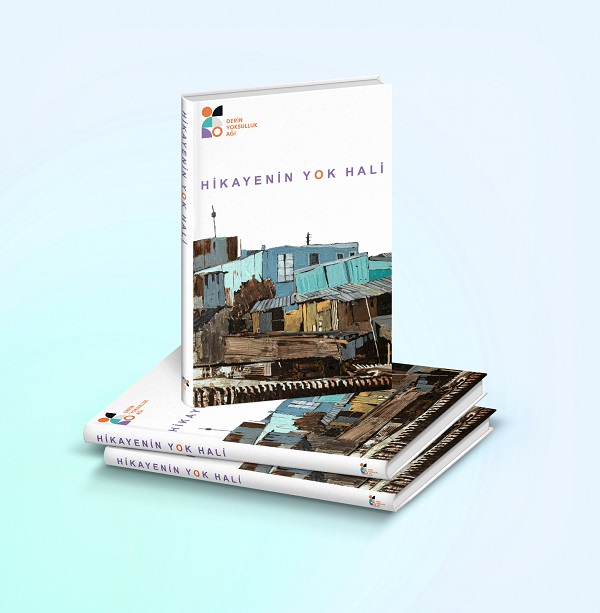The Ignored Deeply Poor and Their Stories Based on ‘Rights’

The Deep Poverty Network has published the book 'Hikâyenin Yok Hali' (‘The Absence of the Story’) which shows the 'ignorance' of the poor and the violations of their rights. Through the true stories of 14 people who experienced poverty, the book reveals the possibilities of both recognizing the poor with their differences and fighting poverty with a rights-based understanding and sustainable policies by protecting human dignity.
‘The poor are ignored by both society and politicians. There are close to 1 million waste collectors and deep poor people with their families in Turkey, but they are not visible. While interventions against waste collectors have been discussed in Turkey in recent days, Deep Poverty Network published the book ‘Hikâyenin Yok Hali’ to draw attention to 17th of October, World Day for the Eradication of Poverty and to remind that the fight against deep poverty is a social issue.
The publication, which includes the private stories of 14 people supported by the Deep Poverty Network within the scope of its activities, was written with a rights-based perspective. At the end of each story, it includes the violation of rights suffered by the people mentioned in that story, how the right that is the subject of the violation should be protected within the framework of national and international legislation, what guarantees are given in the contracts, what obligations they have in this context, and research and data in this field. From this aspect, Hikâyenin Yok Hali tells the story of poverty, reminding the responsibilities of decision-makers from a human rights perspective and showing the steps that politicians should take.
At the same time, it tells why deep poverty is a violation of human rights through stories and emphasizes that it restricts individuals’ access to their basic rights and needs and prevents them from reaching their economic, cultural, and social rights.
Hacer Foggo, the most well-known face of the Deep Poverty Network by the public at the book’s introductory meeting, drew attention to the relationship between social assistance and dependency on the poor in Turkey, and summarized the violation of rights created by the politicians’ failure to address poverty from a human rights perspective, with these words: ‘The poor have a ring on their necks, a ring that politicians loosen and tighten whenever they want. Hikâyenin Yok Hali has emerged with the understanding that “if we know the stories of the deep poor, we will fight poverty.”’
‘Poverty Is Something You Can Understand When You Contact with and Listen to the Poor’
After the introduction of the book, we asked Hacer Foggo why they chose to write a story-book. Foggo replied: ‘There is a lot of research and publication on poverty. But what really impresses people the most is the story.’
In addition, we asked Foggo what her determination that ‘poverty is not angular’ means during the launch: ‘To be poor is to be seen as non-existent. Everyone has an image of poverty, a profile. People act according to that profile. This applies to public institutions as well as to ordinary people. He evaluates people according to their appearance and defines them as “he is poor, she is poor”. But in fact, none of us know that poverty and absence. There are various patterns. Poverty is something you can understand when you go into the house of the poor and do not wave your finger because of how many children the poor have, when you meet them, listen to them. Poverty is something you can understand when you are not trying to teach something to the poor.’
‘So, it’s not angular. A waste collector not just a person carrying a handcart on their back for example, someone who lost an eye while collecting the waste… Or they are not just someone who needs to keep a list of their needs at home, it is necessary to see the wound of a mother’s hands there. There is another story there. So, you have to listen, try to understand them and we have to learn from each other.”
‘We Want to Show the Unsustainable Conditions of Poverty with Real Stories’
After the launch of the book, we asked the publication coordinator Şevval Şener what they are aiming for with this publication. Şener said, ‘We want to show the unsustainable conditions of poverty. We wanted to show this with stories. The stories in this book are real-life stories, and we want to convey the experiences of people in their own language. The title of the book is “Hikâyenin Adı Yok” (The Story Has No Name) because they are not visible.’
When asked about the audience they want to reach with this publication, Şener answered ‘the public, and indeed the politicians’. She added: ‘Politicians, because they are the ones who have to apply international conventions and national legislation in the field of human rights. At the same time, it is the institutions that should eliminate the possibilities of poverty and the politicians who ignore it’.
‘The poor are ignored both by other people in society and at the level of politicians.’
Regarding the content of the publication, Şener said, ‘You will see that each story is ignored at the same time. Don’t ignore the common theme. That’s why it’s called Hikâyenin Adı Yok: this is both being ignored by other people in the society and being ignored at the level of politicians. Because we live together, and they exist. Even though they are visible, the poor in society are neglected.’ Şener underlined that even the poor are visible, their existence is ignored.
‘We hope that those who have discriminatory attitudes towards the poor realize this and change their attitudes.’
Noting that the people who read the publication do not directly call for helping the poor, Şener reminded that they hope that those who have discriminatory attitudes towards the poor will realize this because every discriminatory attitude has a great impact on those people’s lives:
‘They can change their language against the poor. They may begin to think about their prejudices. This is a storybook, but we expect people to change their attitudes by recognizing their own biases and understanding the story.’ Another point that Şevval Şener hoped to draw attention to in the stories was how accessible the dreams of the people who were the subjects of the story were. ‘At the end of each story, we asked those people about their dreams: these people have very achievable dreams like going to the seaside, going on vacation or buying a house, actually.’
‘The Handcart that Gets Heavy’
Here is a short excerpt from the book’s story ‘Ağırlaşan Çekçek’ (The Handcart That Gets Heavy), told by a couple who collects paper and plastic:
‘When I go out, my wife takes care of the children. I never take children with me; they will be miserable. I don’t want them to learn, I don’t want them to learn this job, I want them to go to school. But whoever lives knows, it is very difficult, how many kilos the handcart weighs, it is very difficult to climb up. You are covered in sweat; you want to let it go. Then there’s the traffic, you’re trying to go over the edge of the cars, fast after them. Going downhill is also difficult. It’s all very difficult. If it gets heavy, it’s a problem, if it doesn’t get heavy, you can’t make money.
But whoever lives knows, it is very difficult, how many kilos the handcart weighs, it is very difficult to climb up. You are covered in sweat.
My only dream is to have a decent house… My current house is crawling with cockroaches, it’s always damp. …My second dream is for my children to have an education. They go to school now, of course they will. They will go to school no matter what.’
You can read Hikâyenin Yok Hali, which consists of interviews with Güliz Kalender, Hacer Foggo, Selen Yüksel, Şevval Şener and Şeyma Duman from the Deep Poverty Network, at this link.

Bizi Takip Edin